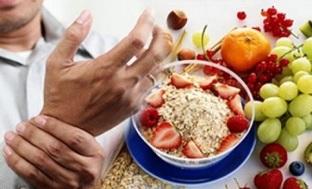Proper nutrition for osteoarthritis of the knee joint is the basis of effective treatment. Anyone interested in improving health should understand what kind of diet is needed for osteoarthritis of the knee. Basic principles, allowed and forbidden food, sample menu - the main issues that need further consideration.
Dietary requirements for osteoarthritis

The main goal of a child for knee joint disease is to lose weight, get the right amount of nutrients that have a positive effect on cartilage tissue and the symptoms of the disease. Proper nutrition must be followed for the rest of your life.
General principles of a child with osteoarthritis:
- The need for a fractional diet. It is recommended to eat in small meals up to five times a day. A fractional diet prevents overeating, and thus guarantees the prevention of excess weight.
- The maximum amount of calories per day is 3500 kcal. Such a calorie content is allowed with an active lifestyle and serious physical work.
- Dinner is needed a few hours before bed.
- It is recommended to constantly monitor your weight.
- The diet includes healthy foods that contain components necessary for the knee joints. Potentially unhealthy foods are excluded from the menu.
- Cookware requires proper heat treatment. The benefits of food depend on it.
- Remove very hot and cold foods. It is recommended to eat hot meals.
- Careful and slow chewing is required. Following this rule will prevent overeating.
- It is recommended to drink one and a half liters a day. The emphasis is on clean water.
The diet is developed under medical supervision in the same way that doctors take into account the patient's health when making recommendations. Experts recommend that you include in your menu products that help get the right amount of nutrients. Support the body is aimed at preventing osteoarthritis and eliminating the symptoms associated with inflammatory processes.
Basic nutrients
Osteoarthritis of the knee requires minerals and vitamins, so this aspect is important when planning a meal.
.jpg)
Vitamin C is considered one of the most important. Vitamin C forms connective tissue, regenerates the cartilage of the knee joint. Antioxidant properties protect the cartilage tissue of the knee from free radicals. Doctors note that women need less vitamin C every day, and men more. Vitamin C also helps to improve the immune system, thanks to which the body fights against inflammation of the knee joints on its own.
Pine promotes bone regeneration. Boron and magnesium contribute to the complete absorption of calcium, necessary for the knee joints. As a result, boron and magnesium, as well as calcium, are needed to prepare the diet. Three components that work together are needed not only for treatment but also for prevention.
Pantothenic acid improves the cellular health of the knee joint. A useful component is present in beef and pork liver, nuts, mushrooms, green peas. The amount of the substance is determined by the severity of the symptoms.
Include omega-3 fatty acids in your diet. The substances eliminate the pain syndrome, inflammation. A pronounced supply of fatty acids is required for a pronounced therapeutic effect.
Prohibited Products
Many people wonder what you should not eat with osteoarthritis of the knee. Some foods contain substances that are potentially dangerous. If food increases the risk of weight gain, skipping is also recommended.
The following foods are excluded from the diet:
- Fatty meat products. Such products lead to weight gain, disrupt the condition of the knee joints, adversely affect motor activity and worsen symptoms.
- Vegetables: white cabbage, peppers, tomatoes. These vegetables contain components that are dangerous for the cartilaginous tissue of the knee joint. For example, the use of tomatoes for osteoarthritis of the knee is minimized, despite the presence of nutritional components in fresh vegetables.
- Fruits and berries that contain acids. Such fruit leads to the accumulation of mineral salts dangerous for the joints.
- Flour products, confectionery. Such foods contain simple carbohydrates that threaten weight gain.
- Coffee. Excessive use of drinks leads to a decrease in calcium salts in the body. This results in joint problems. Calcium deposits help maintain healthy knee joints.
- Alcohol. There is a violation of metabolic processes. Nutrients are no longer absorbed.
- Semi-finished products, street fast food products. Mayonnaise.
- Refined fatty oils.
- Sol. Doctors recommend that you carefully monitor the amount of salt. Excessive salt intake threatens salt deposits, worsening the knee joints.
Doctors additionally forbid smoking because nicotine leads to vasoconstriction, as a result of which metabolic processes are disturbed. Smoking reduces the effectiveness of any treatment.
Fasting is forbidden during healing. The body needs nutrients. The use of diuretics and laxatives is prohibited. Such drugs disrupt metabolic processes, contribute to the loss of nutrients necessary for the knee joints.
Useful products

The diet includes foods useful for osteoarthritis of the knee. Healthy food provides the nutrients needed to improve knee health.
- Poultry, meat, low-fat fish. Meat and fish dishes must be natural. Soups based on meat soups are regularly consumed, but preference is still given to the first vegetable dishes.
- Fermented dairy products. Supplied proteins improve the cartilaginous tissue of the knee joints. The maximum fat content in dairy products should be 3, 2 percent. The menu includes fermented dairy products with a high calcium content.
- Eggs. It is allowed to eat up to three eggs a day. A large number of eggs disrupt metabolic processes, so there is a risk of negative effects on the knee joints.
- Natural meat jellies. The dish contains collagen and chondroitin which are necessary to improve the condition of the cartilage in the knees.
- Nuts. Intake of vitamin E improves metabolic processes, stimulates the flow of useful components in the knee joints.
- Cereals. The most useful are millet, rice, buckwheat, hard pasta. Cooked cereals for the usual time provide nutrients and complex carbohydrates that support the body.
- Fresh vegetables and fruits. These foods contain nutrients that help the body fight knee inflammation.
- Calm mineral water, herbal and green tea. The diet also includes freshly prepared fruit and vegetable juices, previously diluted with water. Healthy drinks help in getting vitamins and maintaining water balance in the body.
Knee osteoarthritis menus include healthy foods that ensure optimal nutrient intake.
Sample menu for the day with osteoarthritis
The diet is varied and nutritious if the menus are correct.
Drink a glass of clean water before breakfast. The fluid improves metabolic processes and cleanses the intestines.
Breakfast
Drink fruit or vegetable juice first. After 20 minutes, it is desirable to eat porridge with a piece of butter. If desired, for breakfast they plan cheesecakes with natural honey, cereal cookies, sandwiches with hard cheese, soft-boiled eggs, vegetable salad. After breakfast, drink green or herbal tea.
Lunch
Fresh fruit or dried fruit is eaten for lunch. Nutrient intake is mandatory in the diet in order to improve health in osteoarthritis.
Lunch
Planning vegetables or meat soup for lunch. For the second are ideal cutlets, baked chops, baked and cooked fish. It is recommended to take into account the presence of vegetable stews, mashed potatoes or baked potatoes, cereals. Rye bread will contribute to the intake of additional substances aimed at improving metabolic processes.
Afternoon snack
For an afternoon snack, they eat fresh sweet fruit, drink a cup of dried fruit compote with dried cookies.
Dinner
Nutritionists recommend a light meal to prevent weight gain. Recommended dishes are vegetable salad, fresh cheese pans with relaxing herbal tea.
When planning a proper diet for osteoarthritis of the knee, the emphasis is on optimal calorie intake, intake of beneficial components.























